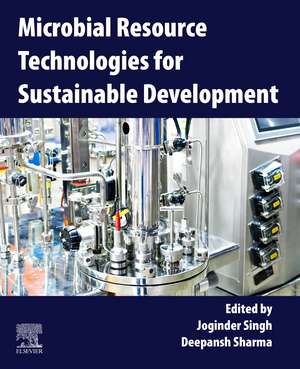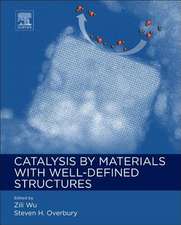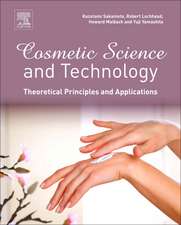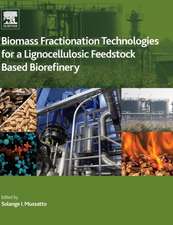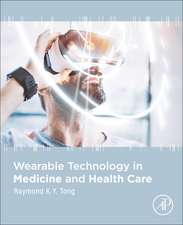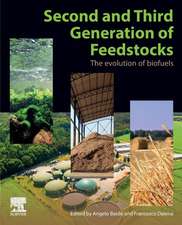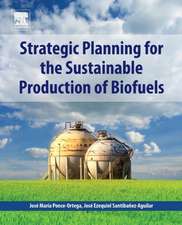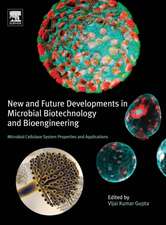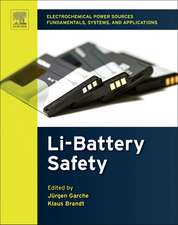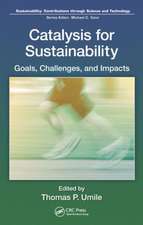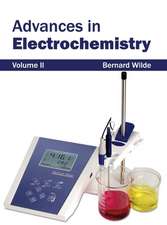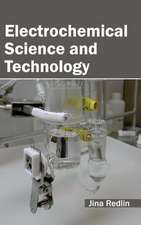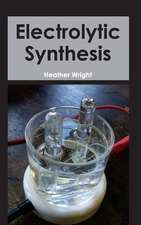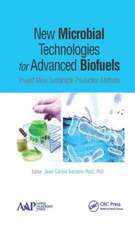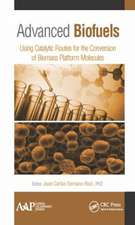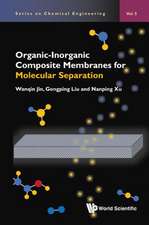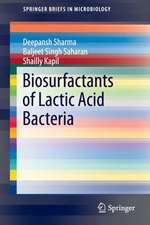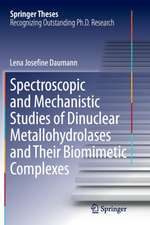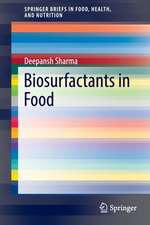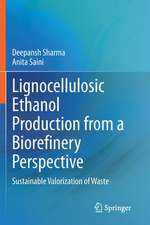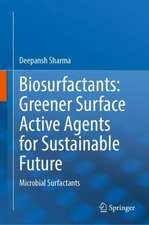Microbial Resource Technologies for Sustainable Development
Editat de Joginder Singh Panwar, Deepansh Sharmaen Limba Engleză Paperback – 24 iun 2022
Other topics discussed include rhizosphere microbiome for enhancement of the cereal crops, endophytic fungal communities in crops grown under different farming systems, microbiota of termite for lignocellulose breakdown, microbial consortium technologies to produce biomethane from waste effluents, microbial technologies for sustainable food additives production, biological synthesis of the nanoparticles, fungal cellulases, and efficient biofuel and acetic acid production using waste residues with an emphasis on the commercial exploitation of such microbial technologies.
- Discusses the enhancement of plant production through growth-promoting microbes
- Considers microbial degradation and environmental management of wastes
- Covers microbial applications in biofuel and bioenergy production
- Explores plant-microbe interactions for removal of heavy metals from contaminated areas
- Explains engineered microorganisms for effective bioremediation
- Describes potential indigenous/effective microbes for food and industrial treatment processes
- Presents research on microbes for sustainable agricultural practices
Preț: 1048.44 lei
Preț vechi: 1371.87 lei
-24% Nou
Puncte Express: 1573
Preț estimativ în valută:
200.61€ • 209.46$ • 166.04£
200.61€ • 209.46$ • 166.04£
Carte tipărită la comandă
Livrare economică 28 martie-11 aprilie
Preluare comenzi: 021 569.72.76
Specificații
ISBN-13: 9780323905909
ISBN-10: 0323905900
Pagini: 492
Dimensiuni: 191 x 235 mm
Greutate: 0.84 kg
Editura: ELSEVIER SCIENCE
ISBN-10: 0323905900
Pagini: 492
Dimensiuni: 191 x 235 mm
Greutate: 0.84 kg
Editura: ELSEVIER SCIENCE
Cuprins
1. Survival and thriving behaviour of bacteria in microbial jungle
2. Microbial Consortium: A New Approach in Sustainable Development
3. Soil microbes as biopolymers for enhancing mechanical properties of soil: A sustainable approach
4. The structure, function and utility of rhizosphere microbiome of cereal crops
5. Importance of diverse soil microbial community in crop rotation for sustainable agriculture
6. Impact of pertinent endophytic fungal communities and their secondary metabolites on crops
7. Microbial technologies for acetic acid production from fruit waste
8. Metabolic interaction network of gut microbiota in Termite for lignocellulose breakdown
9. Biomethane: A sustainable bio-energy source from potential waste effluents
10. Microbial symbiotic implications in exploring novel antibiotics
11. Advancement in the use of microbes as primers for monitoring water quality
12. Microbial resources for efficient lignocellulosic conversion to ethanol production
13. Biological synthesis of metal nanoparticles by microorganism: A sustainable approach
14. Microbial technologies for sustainable food additives production
15. Bioactive peptides production using microbial resources
16. Soil Health Sustenance through Varied Fertility Management Approaches for Increasing Microbial Load under Temperate Climatic Conditions: A Practical Approach
17. Microbial biodesulfurization: A sustainable technology for biorefining of fossil fuels
18. Fungal cellulases: An overview and applications
19. Hybrid nano and microbial consortium technologies to harvest biofuel (biomethane) from organic and agri waste
20. Electrochemically active bacteria as platform technology in microbial electrochemical system (MES)
21. Microbes Enhancing Assimilation and Utilization of Minerals Promoting Plant Health
22. Chromium removal by microorganisms as sustainable a water treatment strategy
23. Improvement of ecological sustainability of in situ bioremediation through coordinated approaches
2. Microbial Consortium: A New Approach in Sustainable Development
3. Soil microbes as biopolymers for enhancing mechanical properties of soil: A sustainable approach
4. The structure, function and utility of rhizosphere microbiome of cereal crops
5. Importance of diverse soil microbial community in crop rotation for sustainable agriculture
6. Impact of pertinent endophytic fungal communities and their secondary metabolites on crops
7. Microbial technologies for acetic acid production from fruit waste
8. Metabolic interaction network of gut microbiota in Termite for lignocellulose breakdown
9. Biomethane: A sustainable bio-energy source from potential waste effluents
10. Microbial symbiotic implications in exploring novel antibiotics
11. Advancement in the use of microbes as primers for monitoring water quality
12. Microbial resources for efficient lignocellulosic conversion to ethanol production
13. Biological synthesis of metal nanoparticles by microorganism: A sustainable approach
14. Microbial technologies for sustainable food additives production
15. Bioactive peptides production using microbial resources
16. Soil Health Sustenance through Varied Fertility Management Approaches for Increasing Microbial Load under Temperate Climatic Conditions: A Practical Approach
17. Microbial biodesulfurization: A sustainable technology for biorefining of fossil fuels
18. Fungal cellulases: An overview and applications
19. Hybrid nano and microbial consortium technologies to harvest biofuel (biomethane) from organic and agri waste
20. Electrochemically active bacteria as platform technology in microbial electrochemical system (MES)
21. Microbes Enhancing Assimilation and Utilization of Minerals Promoting Plant Health
22. Chromium removal by microorganisms as sustainable a water treatment strategy
23. Improvement of ecological sustainability of in situ bioremediation through coordinated approaches
